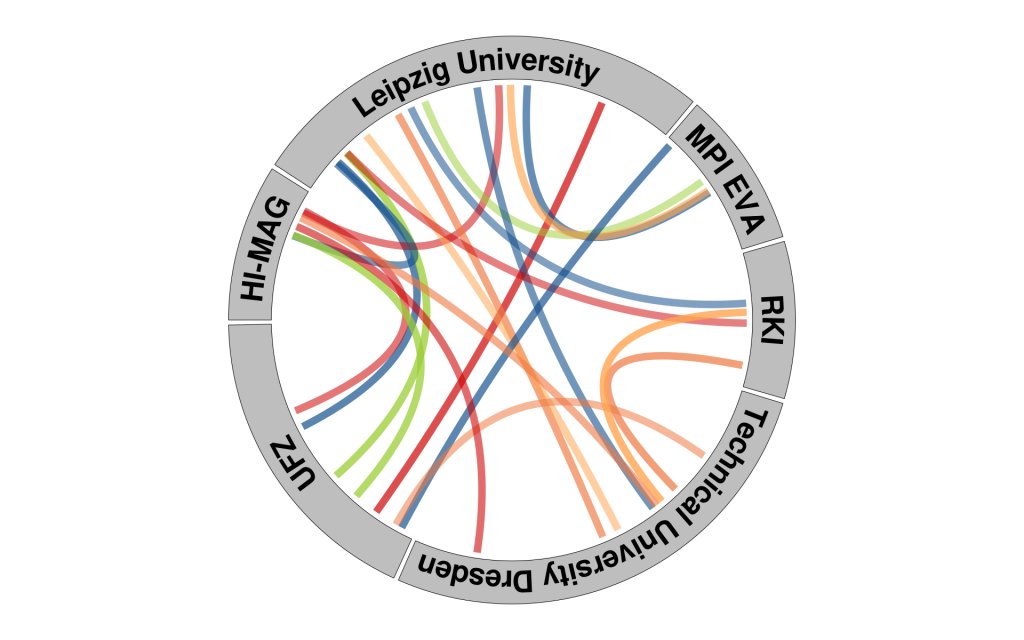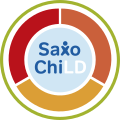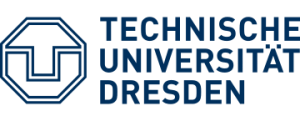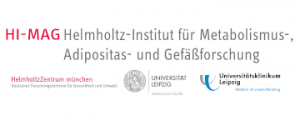SaxoChiLD is an interdisciplinary network of clinicians and scientists covering all relevant disciplines with professional backgrounds relevant to child health and development in medicine, psychology, life sciences, and environmental sciences.

Autism Spectrum Disorders Network
The research association ASD-Net (Autism Spectrum Disorders Network) investigates new diagnosis and treatment options for autism spectrum disorders. Autism spectrum disorders is the term used to describe the various forms of the disease, such as early childhood autism and Asperger’s syndrome. The number of autism spectrum disorder diagnoses has risen continuously in recent years.
The diagnosis of autism spectrum disorders is considered error-prone and particularly difficult. At the same time new and more effective therapies are needed. The ASD-Net will address these issues. A new, internet-based diagnostic tool will be developed in the so-called „Diagnostics Cluster“ of the network. The aim is to simplify and accelerate diagnosis. In the „Therapy Cluster“ the therapeutic potential of oxytocin in the treatment of autism spectrum disorders is investigated. The „Health Economics Cluster“ will collect relevant data for the health care of patients with autism spectrum disorders.
SaxoChiLD principal investigator
- Stefan Ehrlich
- Veit Roessner
External partners
- Universities: Marburg, Göttingen, Berlin (Charité), Bremen, Lübeck;
- Mannheim Central Institute of Mental Health
- MPI for Human Cognitive and Brain Sciences
- Zentrum für Integrative Psychiatrie gGmbH
Affective Dysregulation – Optimization of Prevention and Therapy
The ADOPT (Affective Dysregulation – Optimizing Prevention and Treatment) Consortium integrates internationally established, highly experienced and interdisciplinary research groups. The work program encompasses:
- epidemiology, including prevalence of symptoms and disorders
- development and evaluation of screening and assessment tools
- stepped care approaches for clinically useful personalized medicine
- evaluation of an easily accessible and cost-effective online intervention,
- evaluation of an intensive personalized modular outpatient treatment in a cohort of children with affective dysregulation who live with their parents and in a cohort of children with affective dysregulation who live in out-of-home care
SaxoChiLD principal investigator
- Christian Beste
- Veit Roessner
External partners
- Universities: Cologne, Hamburg-Eppendorf, Ulm, Rostock
- Mannheim Central Institute of Mental Health
- Ruppiner Kliniken GmbH
The CarbHealth-project received funding from the Joint Programming Initiative “A Healthy Diet for a Healthy Life” and from the ERA-NET Cofund HDHL INTIMI. The project will started April 1st 2020 and will last for three years. The project is led by Professor Jutta Dierkes with partners Simon Ballance from Nofima AS (Ås, Norway), Anette Buyken from the University of Paderborn (Germany), Antje Körner from the University of Leipzig (Germany) and Rikard Landberg from the Chalmers University (Sweden). Combining a randomized clinical trial, data from existing cohorts in middle-aged (HUSK-study, Norway) and children (Leipzig Atherobesity Childhood cohort and Life Child, Germany), and a meta-analysis of published RCTs and observational studies, the project will address the overall hypothesis that diets that are high in habitual consumption of dietary fiber, also through regular consumption of high-fiber bread, can form an integral part of a plant-based healthy diet associated with benefits for body weight and T2DM risk.
SaxoChiLD principal investigator
- Antje Körner
External partners
- Universities: Magdeburg, Paderborn
- Norway: University of Bergen
- Sweden: Chalmers University of Technology, Umeå University, Industry
Loosing and regaining control over drug intake
The major risk factor for global death and disability is alcohol and tobacco use. While insight into individual factors promoting the initiation and maintenance of substance use is increasing, a profound lack of knowledge remains as regards modulating factors and mechanisms involved in losing and regaining control over drug intake. Improving treatment of substance use disorders (SUDs) a better understanding of these factors and mechanisms will be crucial to improve treatment of substance use disorders.
The goal of the information infrastructure project „Loosing and regaining control over drug intake (CRC Transregio 265)“ is to establish a centralized participant, study data managementand. It should support the organisation of research (e.g. study planning, centralised participant recruitment and administration), provide integrated research data management (including data and metadata management, sharing and publishing of data) and implement a link to analysis capacities. As the data are personal data, concepts and methods for data protection play a special role.
SaxoChiLD principal investigator
- Christian Beste
- Clemens Kirschbaum
External partners
- Universities: Berlin (Charité, HU, FU), Heidelberg, Potsdam
- Mannheim Central Institute of Mental Health
- MPI for Biological Cybernetics, Helmholtz
- Karlsruhe Institute of Technology
Early Growth Genetics Consortium
The EGG (Early Growth Genetics) Consortium represents a collaborative effort to combine data from multiple genome-wide association studies (GWAS) in order to identify additional human genome loci that have an impact on a variety of traits related to early growth.
SaxoChiLD principal investigator
- Antje Körner
- Wieland Kiess
- Roland Pfäffle
External partners
- Consortium encompassing >40 cohorts world-wide with ~90,000 children with genomic data and investigator initiated studies
TIPS Tailored Immunotherapy for Paediatric SIRS
TIPS is a project on personalised medicine for improved understanding and management of paediatric systemic inflammatory response syndrome (SIRS). SIRS, which can affect children without predisposing factors is a life-threatening event due to an uncontrolled activation of the immune system as a results of often unknown triggers. For the majority of patients, acute management of SIRS is based on clinical features and routine laboratory parameters without distinct stratification, demonstrating the need for better and precise diagnostics. We aim to generate personalized immune profiling and to identify diagnostic patterns in order to develop individualized therapies to improve patient outcome. In this transnational endeavour, we will integrate consideration of ethico-legal aspects of patient safety and data protection.
SaxoChiLD principal investigator
- Catharina Schütz (coordinator)
External partners
- University of Helsinki, Finland
- University of Luxembourg
- Istanbul University, Turkey
European Reference Network for Rare Immunodeficiency, Autoinflammatory and Autoimmune Diseases
The RITA network aims at harmonizing diagnostic and therapeutic guidelines for all affected patients, independent of national and ethnic origins, resulting in access to diagnostic tests and therapies such as biologic therapies, Immunoglobulin replacement, stem cell transplantation, and gene therapy.
A strength of RITA is that it is built on existing scientific networks for PID, SAID, vasculitis and pediatric rheumatic diseases, with more than 100 potential centres involved to varying degrees across the EU Member States. These networks are represented in the governance structure with the largest and most experienced centres forming the core group of RITA members.
SaxoChiLD principal investigator
- Min Ae Lee-Kirsch (site speaker)
External partners
- Participating institutions across Europe
Early, valid and reliable screening for autism
The network around EVAS (Early, Valid and Reliable Autism Screening) is concerned with the development of an innovative, web-based screening tool, which should ensure early and valid access to specialised diagnostics and therapy. The aim of the project is to improve the allocation of children and adults suspected of having ASD to specialised services. This should enable the capacities of highly specialised institutions to be used more efficiently.
As a precursor to the EVAS project, the ASD-Net, a consortium funded by the Federal Ministry of Education and Research (BMBF), is concerned with the investigation of diagnostics, therapy and health care of ASD from 2015 to 2021. The network brings together Germany’s largest cohorts of children, adolescents and adults in the autism spectrum who have been diagnosed using ADI-R/ADOS.
SaxoChiLD principal investigator
- Veit Roessner (co-coordinator)
External partners
- Universities: Berlin (Charité), Marburg, Göttingen
The Saxonian Center for feto/neonatal Health (SC-FNH) has the mission to improve long-term health. Its research is focused on the most critical time of life – the feto/neonatal period. The SC-FNH is part of a large collaborative network with well-established interdisciplinary cooperations and a large international clinical trial network.
SaxoChiLD principal investigator
- Mario Rüdiger (coordinator)
External partners
- Universities Jena & Tübingen
- 2 health insurances
- Bundesverband Frühgeborene Kind e.V.
- Forschungsnetz Deutsche Gesellschaft für Perinatale Medizin
- International partners from Canada, USA, UK, Portugal, Netherlands, Spain, Poland
live healthy together in family and school
„Familieplus live healthy together in family and school“ focuses on a preventive approach to promoting weight-related behaviour in the environments of children and young people. The aim of the project is to promote a healthy lifestyle with more exercise and a balanced diet among primary school children and their families.
SaxoChiLD principal investigator
- Antje Körner
External partners
- Universities Konstanz & TU Munich
- „Plattform für Ernährung und Bewegung“
Current antiretroviral therapy cannot cure HIV infection. This is based on the fact that, upon infection, HIV permanently integrates its genes (i.e. the proviral DNA) into the genome of the infected host cell. The aim of this project is to reverse infection by excision of the integrated proviral DNA from host cell genomes using the HIV-1-specific designer recombinase Brec1.
SaxoChiLD principal investigator
- Frank Buchholz
External partners
- Leibniz: Institute for Experimental Virology
- USA: Tufts School of Medicine, Boston
Food Allergy Biomarker Application
NAMIBIO’s goal is the development of a meaningful prediction model of early life food allergy. To this end, we capitalize on some of the largest and best-characterized German birth cohort studies providing comprehensive longitudinal, multimodal datasets including clinical data, demographics, lifestyle, and psychosocial factors. These will be fed into machine learning approaches to develop an accurate prediction model to be triangulated against synthesized evidence from literature forecasting the individual risk for food allergy early in life. We will combine these data with biomarkers identified from de novo generated genome-wide epigenetic data to obtain a mechanistic understanding on the role of prenatal stressors in food allergy development. These results will inform the development of digital health applications (App), which will be developed for parents and health care providers informed by state-of-the-art empirical studies to guide parents of children at high risk for food allergy development in the management of their needs and in efforts towards targeted prevention and intervention.
SaxoChiLD principal investigator
- Jon Genuneit
- Wieland Kiess
External partners
- Universities: Berlin (Charité), Magdeburg, Regensburg
- Industry
- Patient organization
National Pandemic Cohort Network
The National Pandemic Cohort Network (NAPKON), together with other components of the University Medicine Network (NUM), creates basic infrastructures for research on pandemics such as COVID-19 with the goal to successfully combat the pandemic.
SaxoChiLD principal investigator
- Reinhard Berner
External partners
- Universities: Berlin (Charité), Cologne, Heidelberg, Munich (LMU) and others
Pregnancy And Childhood Epigenetics
The Pregnancy And Childhood Epigenetics (PACE) consortium is comprised of researchers at NIEHS and around the world who are interested in studying the early life environmental impacts on human disease using epigenetics.
SaxoChiLD principal investigator
- Antje Körner
- Wieland Kiess
- Ana Zenclussen/Gunda Herberth
External partners
- >40 studies, ~30,000 children world-wide with genome and methylome data from pregnancy/newborn/childhood samples, association of early life environment and human disease
Remote Sensing Centre for Earth System Research
The Faculty of Physics and Earth Sciences at Leipzig University and the Helmholtz Centre for Environmental Research (UFZ) have teamed up and established the Remote Sensing Centre for Earth System Research to expand research in this area and better understand ecosystem functioning in a changing world.
SaxoChiLD principal investigator
- Sabine Attinger/Jian Peng
External partners
- Universities Jena & Halle-Wittenberg
- iDiv
- MPI Biochemistry Jena
- Leibniz Institutes: Regional Geography, Tropospheric Research, Surface Engineering
- German Aerospace Center
Theory of event coding for Tourette Syndrome
Gilles de la Tourette’s Syndrome (GTS) is a common multifaceted neuropsychiatric spectrum disorder clinically characterized by the presence of motor and vocal tics and is considered a neurological developmental disorder. Tics are usually classified as movement disorders. However, tics differ in many ways from ‚classical‘ movement disorders and are closer to physiologically occurring but excessive movements and actions. The special relationship between ‚tics‘ and urges points to altered perceptual processes and the strong attention-dependency of the tic attribute to disturbances in attention and action selection processes, so that perception and action aspects must be taken into account in a comprehensive concept for explaining GTS. The Theory of Event Coding (TEC) provides a conceptual framework for this. This fundamentally new approach will be pursued in this research group initiative TEC4Tic.
SaxoChiLD principal investigator
- Christian Beste
- Shu-Chen Li
- Veit Roessner
External partners
- University of Lübeck
TERrestrial ENviromental Observatories
TERENO is embarking on new paths with an interdisciplinary and long-term research programme involving six Helmholtz Association Centers. TERENO spans an Earth observation network across Germany that extends from the North German lowlands to the Bavarian Alps. This unique large-scale project aims to catalogue the longterm ecological, social and economic impact of global change at regional level. Scientists and researchers want to use their findings to show how humankind can best respond to these changes.
SaxoChiLD principal investigator
- Sabine Attinger
External partners
- Universities: Aachen, Bonn, Cologne
- Helmholtz: German Research Centre for Geosciences,
- Forschungszentrum Jülich
- Karlsruhe Institute of Technology
- German Aerospace Center
https://translate-namse.charite.de/en
SaxoChiLD principal investigator
- Reinhard Berner (site speaker)
- Min Ae Lee-Kirsch
External partners
- Universities: Berlin (Charité), Heidelberg, Munich (LMU), Hamburg, Lübeck, Bochum, Bonn, Tübingen and 2 health insurances
Unlocking Precision Gene Therapy
The overall goal of UPGRADE is to overcome current limitations that are hindering broad application of gene therapy, improving the safety, efficiency and in vivo delivery of advanced medicinal products (AMPs) based on gene and epigenome editing.
UPGRADE involves eight partners from seven Countries, including a non-EU partner (from USA). Moreover, a panel of independent scientists from the Scientific Advisory Board will provide strategic guidance and support the partnership to ensure that the project’s results meet the objectives.
SaxoChiLD principal investigator
- Frank Buchholz
External partners
- Germany: LMU Munich
- Belgium: Vrije Universiteit Brussel
- France: Universite de Nantes
- Italy: Fondazione Telethon, Universita Degli Studi di Trento
- Spain: Universidad Pompeu Fabra
- USA: Massachusetts General Hospital
The transCampus© initiative was initiated in 2015 and builds a unique partnership between two of Europe’s leading academic institutions, King’s College London and TU Dresden. The transCampus© aims to coalesce the resources and individual strengths of both institutions to create a complementary academic and clinical platform stimulating, supporting and enabling collaborations and transnational projects. It acts as a wide academic stage within students from both universities can move freely and benefit from the respective academic programs. Beyond the contribution to joint projects, PIs from the transCampus® provide their international perspective, networks and their access to the excellent infrastructure at the KCL’s Institute of Psychiatry, Psychology & Neuroscience (IoPPN) to our site. IoPPN is a top-ranking world-leading center of mental health research (second after Harvard and leading in Europe) that promotes cutting edge collaborative research within an interdisciplinary context.
SaxoChiLD principal investigator
- Emily Simonoff
External partners
- King’s College London
Begleitforschung zur BMBF-Förderinitiative Gesund – ein Leben lang
BeLLa is the module on mental health and quality of life of the nationwide Child and Youth Health Survey (KiGGS) of the Robert Koch Institute and comprises a representative sub-sample of the KiGGS with approx. 3000 children and adolescents (7-17 years) and their parents and young adults.
SaxoChiLD principal investigator
- Julika Loss (coordinator)
Volition and cognitive control
The aim of the „CRC 940 Volition and cognitive control“ is to elucidate cognitive and neural mechanisms underlying the volitional control of goa-directed action as well as to investigate impairments of self-control. The ability to exert volitional control over one’s actions is a precondition for personal autonomy and one of the most impressive yet least under-stood capacities our brains endow us with. Conversely, impairments of volitional self-control are a charac-teristic of many harmful behaviors such as unhealthy eating habits, substance use, and behavioral addic-tions, which are associated with massive adverse consequences for individuals and great societal costs. The CRC thus addresses not only one of the major scientific challenges for basic research in psychological and neuroscience, but also a topic of high social relevance. The research program rests on an integrative theoretical framework, according to which volitional control rests on dynamic interactions between multiple neurocognitive systems. The CRC integrates a wide range of methods from experimental and biological psychology, cognitive com-putational, and social neuroscience, as well as clinical psychology, psychiatry, and developmental neuro-science.
SaxoChiLD principal investigator
- Christian Beste
- Stefan Ehrlich
- Clemens Kirschbaum
- Shu-Chen Li
- Veit Roessner
External partners
- Charité, Berlin
Obesity is a multifactorial disorder influenced by a combination of genetic, behavioral, life style and environmental factors, including fetal programming, control of appetite and energy expenditure, availability and nutritional content of food. Because the factors (and their interaction) causing obesity are only incompletely understood, weight loss strategies may not address the underlying causes of energy imbalance. Therefore, the ultimate long-term aim of the Collaborative Research Centre (CRC) 1052: “Obesity Mechanisms” is to define novel targets and mechanisms for future therapeutic approaches in the treatment of obesity.
In three main research areas, we aim to unravel complex mechanisms in the control of energy homeostasis by the central nervous system (A, Overeating), the determination of adverse fat deposition and its associated adipose tissue dysfunction and inflammation (B, Fat Deposition and Inflammation), and the regulation and effects of altered adipokine secretion in obesity (C, Adipokines).
SaxoChiLD principal investigator
- Matthias Blüher (coordinator)
- Antje Körner
- Markus Scholz
- Martin von Bergen
External partners
- Universities: Ben-Gurion University of the Negev, Beer-Sheva, Israel, MPI-CBS
The overall goal of this initiative is to gain new insight into the specific molecular mechanisms that govern the defense against foreign nucleic acids and that, if dysregulated, contribute to the pathogenesis of a variety of human disorders, such as chronic viral infection, autoinflammation and autoimmune diseases. The consortium addresses the following overarching questions: i) How is nucleic acid metabolism functionally connected to the nucleic acid defense system? ii) How are defined stress responses linked to the nucleic acid defense pathways? iii) What are the molecular mechanisms that link DNA damage and repair pathways to nucleic acid defense pathways? iv) What are the molecular switches that regulate a type I IFN response versus inflammasome-induced cell death? v) What are the pathogenic principles by which dysregulated nucleic acid immunity causes sterile inflammatory disease? vi) How does recognition of pathogen-associated nucleic acids contribute to the initiation of an antimicrobial response, and how does dysregulation limit the resolution of infection and trigger infection-associated autoimmune phenotypes?
SaxoChiLD principal investigator
- Min Ae Lee-Kirsch
External partners
- University of Bonn
- LMU Munich
- MPI of Biochemistry Munich
- Philips-University of Marburg
Center for Tactile Internet with Human-in-the-Loop
CeTI’s central vision is to enable humans to interact in quasi real-time with cyber-physical systems (CPS) in the real or virtual world over intelligent wide-area communication networks. Such advances go far beyond the current state-of-the-art approaches in computer and engineering sciences: intelligent communication networks and adaptive CPS for quasi real-time co-operations with humans require online mutual learning mechanisms, which are crucial challenges.
To tackle these challenges, CeTI will conduct unique interdisciplinary research and will address major open research topics in key areas of the complexity of human control in the human–machine loop, sensor and actuator technologies, software and hardware designs, and the communication networks as the basis for several novel use cases grouped in medicine, industry, and the Internet of Skills.
SaxoChiLD principal investigator
- Shu-Chen Li (co-speaker)
Decisions in metabolic inflammation of the liver
The aims of this project are: (i) To characterize in the context of obesity-related metabolic disease novel processes mediating inflammatory cell retention, especially in the liver. In this context, we will also address the novel hypothesis that adhesive interactions of inflammatory cells (with e.g. parenchymal cells) in the metabolically challenged environment of obese organs may activate them via alterations in their cellular metabolism, thereby contributing to perpetuation of inflammation. (ii) To understand resolution of inflammation including inflammatory cell egress from metabolic organs, especially from the liver in metabolic-inflammatory disease.
SaxoChiLD principal investigator
- Triantafyllos Chavakis (coordinator)
https://digitalhealth.tu-dresden.de
The Else Kröner-Fresenius Center (EKFZ) for Digital Health, is a joint cross-faculty initiative of the Technische Universität Dresden (TUD), the University Hospital Carl Gustav Carus Dresden (UHD) along with several Fraunhofer and Helmholtz institutes on the Dresden campus.
The EKFZ focuses its research effort on the direct interface of the digital world to the patient thereby serving as a bridge between medical big data efforts and traditional biomedical engineering. The EKFZ is structured in virtual application rooms that represent strategic development areas and will be strengthened by specific appointments for center professorships, and in core rooms, which provide the scientific infrastructure and theoretical basics. The competences from the core rooms are the basis for successful translation of high-tech innovation into routine care.
SaxoChiLD principal investigator
- Triantafyllos Chavakis
- Sebastian Zeissig
Designer recombinase for efficient and safe genome surgery
The objective of this project is the development of a universal genome editing platform that allows flexible, efficient and safe gene corrections in cells of any origin without triggering cell intrinsic DNA repair. GenSurge aims to: i) sequence an unprecedented, comprehensive compendium of evolved SSRs to understand the directed molecular evolution process at nucleotide resolution; ii) integrate the knowledge obtained in i) to develop a unique SSR-based approach to correct genomic inversions; iii) develop a universal SSR-based strategy that allows flawless, precise and safe genome editing to correct any gene defect in human, animal or plant cells. The successful implementation of this project will deliver a comprehensive, safe and efficient platform from which genome surgery-based cure strategies can be initiated.
SaxoChiLD principal investigator
- Frank Buchholz (coordinator)
Helmholtz Initiative on Climate Adaptation and Mitigation
HI-CAM is a research initiative of the Helmholtz association on climate change adaptation and mitigation. The project combines expertise in the research fields of energy and climate. It aims to draft scientifically based recommendations for action for decision-makers in politics and research. The cooperation between science and stakeholders is divided into three clusters: (1) Climate Adaptation, (2) Climate Mitigation and (3) Communication.
SaxoChiLD principal investigator
- Sabine Attinger/Luis Samaniego
German Centre for Integrative Biodiversity Research Halle-Jena-Leipzig
iDiv is a DFG research centre with more than 350 employees and members based primarily in Halle, Jena and Leipzig. Researchers from 30 nations establish the scientific basis for the sustainable management of our planet’s biodiversity.
SaxoChiLD principal investigator
- Martin von Bergen
External partners
- Multiple national partners
The center researches and treats obesity (adiposity) and its secondary diseases in children, adolescents, and adults. It is a joint center of the University and the University Hospital Leipzig – sponsored by the Federal Ministry of Education and Research.
SaxoChiLD principal investigator
- Matthias Blüher
- Antje Körner
- Anja Hilbert
LIFE Child within the Leipzig Research Centre for Civilization Diseases
The LIFE Child study is a longitudinal cohort study conducted at the Research Center for Civilization Diseases in Leipzig, Germany. Its purpose is to monitor child development and investigate factors associated with health and disease, with a particular focus on lifestyle diseases such as overweight and allergies.
The LIFE Child study started in 2011 and is ongoing. Currently, data on ~5,000 Leipzig children and their parents and siblings with ~3,500 annual examinations. Broad and deep phenotyping including under-researched areas (e.g. dental health, vision, voice and language acquisition). Study methodology ranges from state-of-the-art interviews to geo-referenced environmental data, mobile sensing, 3D body scanning, and biosampling of blood (sera, DNA, RNA, cells), urine, stool, hair, placenta, and breast milk and multiple molecular ~omic traits.
SaxoChiLD principal investigator
- Wieland Kiess (coordinator)
- Antje Körner (co-coordinator)
Prevention of childhood Acute Lymphoblastic Leukemia immunology links oncology
Acute lymphoblastic leukemia (ALL) is the most common type of childhood cancer and it is a major cause of death in children aged 2–6 years in developed countries. One hypothesis is that an abnormal immune response to a common infection may be a trigger for ALL. The goal of the EU-funded PreventALL project is to analyse the postnatal genetic risk of B-cell-precursor (BCP)-ALL and to discover the mechanism by which exposure to infection causes BCP-ALL. The project team recently developed in vivo murine models with infection-dependent BCP-ALL. The project aims to investigate the synergy of genetic predisposition and exposure to infection in BCP-ALL as a proof of concept for the role of infection in precancerous disease, setting the starting point for the development of innovative leukemia prevention methods.
SaxoChiLD principal investigator
- Julia Christina Hauer (coordinator)
Smartphone-supported behavioral weight loss treatment in adults with severe obesity: An exploratory randomized-controlled study
SaxoChiLD principal investigator
- Anja Hilbert (coordinator)
SUCCEED-F StUdy on Common Childhood Environmental Exposures and Diseases: Feasibility
SaxoChiLD principal investigator
- Antje Körner (coordinator)
- Wieland Kiess
- Jon Genuneit
SaxoChiLD institutions also belong to the German hub of conect4children, an EU-funded pan-European clinical trial network. The c4c research network brings together pharmaceutical companies, paediatric national networks as well as EU multinational sub-specialty networks, large patient advocacy groups, children’s hospitals and other public research organisations from across Europe. The project consortium is a novel collaboration between academic and private sectors that includes 35 academic and 10 industry partners from 20 European countries, as well as more than 50 third parties and around 500 affiliated partners.
The central goal of the BMBF-funded cluster4future SaxoCell is to develop new areas of application and production methods for personalized gene and cell therapeutics, so-called “living drugs”. The aim is to produce cells with precisely defined functions and a high safety profile for safe and clinical use on an industrial scale and at socially acceptable costs in order to enable a realistic and portable economic model with high value-added potential.
SaxoChild principal investigator
- Frank Buchholz
- Mario Rüdiger
External partners
- Institutions in Leipzig, Dresden, and Chemnitz







